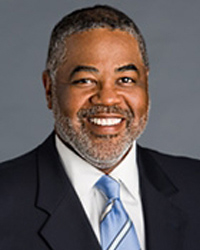
Kenneth J. Bacon
Title: Executive Vice President, Multifamily Mortgage Business, Fannie Mae
Headquarters: Washington, D.C.
Website: www.fanniemae.com
Primary Business: Financial services
Education: BA, Stanford University; MS, London School of Economics; MBA, Harvard Business School
What I’m Reading: Steve Jobs; by Walter Isaacson
Interests: Golfing, hunting, wine, education
Fannie Mae Retiree led Fannie Mae’s Katrina Response and Low-Income Financing for Millions
Over the past 11 years, Fannie Mae’s Multifamily Mortgage Business has financed 7.6 million units of rental housing under the seasoned leadership of Kenneth J. Bacon, executive vice president of the division.
Today, Fannie Mae is the largest single source of financing for rental housing in the country, ensuring that funds are available to build and maintain the quality rental housing that American families depend on.
Bacon will retire in March, concluding a 19-year tenure at Fannie Mae, which also included responsibility for management and marketing of Fannie Mae’s portfolio of multifamily loans and investments, and roles serving single-family housing and directing investments in community development.
Ken is from Houston and resides in Washington, D.C. A distinguished scholar, he has earned an MBA from the Harvard Business School, an MS in international relations from the London School of Economics (where he studied as a Marshall Scholar,) and a Bachelor of Arts degree from Stanford University. Bacon is also on the board of directors for Comcast.
Bacon has guided the multifamily business to a profitable niche serving the workforce rental market. Almost 90 percent of the units Fannie Mae financed in 2011 were affordable to low- and middle-income families.
“Fannie Mae has a terrific mission, to finance rental housing for millions of Americans,” says Bacon. “Keeping capital flowing to the market for affordable rental housing provides stability for our communities and the nation.”
Under his leadership, the multifamily business has provided a total of $289 billion in liquidity to the rental market. He also led Fannie Mae’s response to Hurricane Katrina in 2005, when 300,000 homes were severely damaged or destroyed along the Gulf Coast. Fannie Mae has worked with nonprofits, government agencies, and business partners and invested nearly $5 billion in debt and equity to finance multifamily apartments and support housing recovery after the devastating storm.
“Fannie Mae’s job is to support housing in all markets and at all times,” Bacon says. “That includes the national market as it grapples with the current housing crisis and also local and regional housing markets when they are affected by a natural disaster or an economic downturn.”
Bacon attributes the success of Fannie Mae’s multifamily organization to the strength of his team. “I take a lot of pride in what we’ve accomplished, and I do mean ‘we,’ he says. “Our employees bring years of experience, expertise, and energy to this business. They understand their customers and know the products backward and forward. These are folks who get things done. But more importantly, they enjoy the process of getting there.”
“Fannie Mae’s mission has never been more critical than it is right now. Fannie Mae is committed to building a sustainable housing market and stable communities for the future,” adds Bacon. “I am proud of the legacy I leave behind and feel confident Fannie Mae is poised for continued success serving America’s rental housing needs.”
What is your most rewarding career accomplishment? Establishing the Securitization Program while working for the Resolution Trust Corporation. The savings and loan crisis of the late 1980s had significant effects on the US economy, particularly on commercial real estate. The program that I established had never been done previously and was critical to settling this segment of the market.
What’s the worst mistake a leader can make? Remaining in a single position of power for too long and having a certain level of comfort. It is paramount that all of us, including those who lead, understand progression is necessary for continued growth, for ourselves and for our future leaders.
What was the best advice you ever received? My mother once told me that I was too old and too black to expect life to be fair. While it was difficult to comprehend initially, as I matured I understood that regardless of our best efforts, there are some things that will not go as we expect, and that some of these things will not seem to be just or rational.







I remember in the first or second grade with Ken in Houston he was teaching the teacher a math problem.